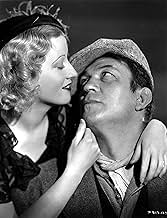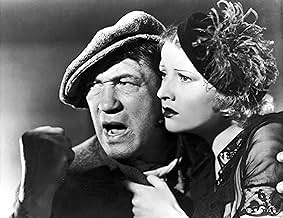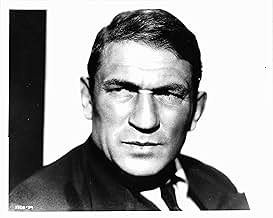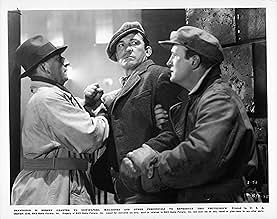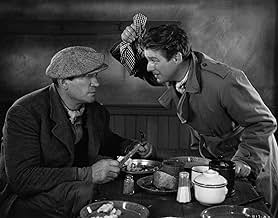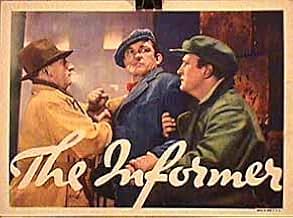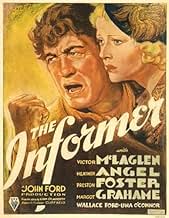IMDb-BEWERTUNG
7,3/10
7629
IHRE BEWERTUNG
Füge eine Handlung in deiner Sprache hinzuIn 1922, an Irish rebel informs on his friend, then feels doom closing in.In 1922, an Irish rebel informs on his friend, then feels doom closing in.In 1922, an Irish rebel informs on his friend, then feels doom closing in.
- Regie
- Drehbuch
- Hauptbesetzung
- 4 Oscars gewonnen
- 13 Gewinne & 4 Nominierungen insgesamt
Joe Sawyer
- Barty Mulholland
- (as Joseph Sauers)
Steve Pendleton
- Dennis Daly
- (as Gaylord Pendleton)
Denis O'Dea
- Street Singer
- (as Dennis O'Dea)
Frank Baker
- Small Role
- (Nicht genannt)
Empfohlene Bewertungen
This film deals with the Irish rebellion in the 1920s and more specifically one man's life after he informs on a friend for the bounty on his head and the subsequent consequences. Watching the film, I got the feeling that you could take the script and with just some minor updates, do it again and it, sadly, would still fit contemporary events. But te remake wouldn't be nearly as good. A magnificent performance by Victor McLaglen (for which he deservedly got an Oscar) and a fine ensemble cast that includes most, if not all the actors with brogues in Hollywood at the time, most of them recognizable character actors either established at the time or just starting out. A very good film well worth watching. Highly recommended.
A brilliant portrait of a traitor (Victor McLaglen in Oscar winning performance) who is hounded by his own conscience. McLaglen plays an IRA rouge who betrays his leader to collect a reward during Ireland's Sinn Fein Rebellion. The scenes showing fights and mob actions are very realistic, focusing on the desperation within individuals. The lack of hope for a better future seems to be a fate worse than death.
Director John Ford superbly creates an murky and tense atmosphere, enhanced by the foggy and grimy depiction of the Irish landscape. Max Steiner's dramatic music score adds to the cinematic delight. Oscar Winner also for Best Screenplay, nominated for Best Picture. This is one of Hollywood's Classic.
Director John Ford superbly creates an murky and tense atmosphere, enhanced by the foggy and grimy depiction of the Irish landscape. Max Steiner's dramatic music score adds to the cinematic delight. Oscar Winner also for Best Screenplay, nominated for Best Picture. This is one of Hollywood's Classic.
An excellent movie of the issue of being an informant and the consequences of the deed. Victor McLagen gives a sympatheic performance as Gypo Nolan, a man who's only way to Move to America is to tell on his best friend. This was one of the first movies that looks into the lives and organization of the IRA(Irish Republic Army). The Informer(1935) is good at showing the poverty stricken Northern Ireland of the 1920's.
Although John Ford has been making films since the early teens, it is this movie that put his name on the map. The Informer(1935) along with The Searchers(1956) are John Ford's most Catholic driven motion pictures as it deals with guilt and redemption. John Ford was good at showing the lifestyles and values of many Irishmen in many of his work. I Only wish that this movie was available on Home Video as it is hard to find.
Although John Ford has been making films since the early teens, it is this movie that put his name on the map. The Informer(1935) along with The Searchers(1956) are John Ford's most Catholic driven motion pictures as it deals with guilt and redemption. John Ford was good at showing the lifestyles and values of many Irishmen in many of his work. I Only wish that this movie was available on Home Video as it is hard to find.
Victor McLaglen, the title character of John Ford's THE INFORMER, reminded me of the circus man from Fellini's LA STRADA. Anthony Quinn played the brutish man, who may have even been influenced by the pug-faced, Oscar-winning performance given by McLaglen. Poverty-stricken Dublin is the true-life, atmospheric setting of the picture, which takes place in 1922. Dense fog and a long damp night are the main elements of a story about deep Irish patriotism and the fight of the Irish Republican Army. The conflict of individuality and the cause is what makes THE INFORMER tick. McLaglen's large, simple character just wants to go to America and we're reminded by signs of the price for a ticket frequently. Two different signs become the psychological centerpiece for the drunken Irishman. One is the previous, the other a WANTED sign. Should he do it and get the money to go?
John Ford once famously said, "My name is Ford. I make Westerns." After seeing this film, he obviously could do a heck of a lot more. The serious social issues dealt with here are heartfelt and ones you will find yourself thinking about. And the look of the piece is amazing, consisting of long dark shadows cutting into a miserable Ireland night. Ford was always known for his luminescent, gorgeous cinematography that helped to foresee the conflicts within his characters. This is hard in color, but he did it in pictures like THE SEARCHERS, painting John Wayne in a sometimes vicious manner. Victor McLaglen's performance not only benefits from the lighting, but by the sheer simplicity of his acting. He shoves a lot. He knocks people out. He is a brute who knows no better. He should, however, know whether or not to cross the IRA.
See the film to find out the gritty details. See it also for McLaglen and Ford's patriotic portrayal of the IRA. Max Steiner's score is innovative in how it matches gestures of the characters, placing more emphasis on them. This was usually only seen in silent films, especially Chaplin. The topic of naming names or "informing" is obviously still important. Just look at how the media covered this year's Oscars, giving much attention to the Elia Kazan scandal.
John Ford once famously said, "My name is Ford. I make Westerns." After seeing this film, he obviously could do a heck of a lot more. The serious social issues dealt with here are heartfelt and ones you will find yourself thinking about. And the look of the piece is amazing, consisting of long dark shadows cutting into a miserable Ireland night. Ford was always known for his luminescent, gorgeous cinematography that helped to foresee the conflicts within his characters. This is hard in color, but he did it in pictures like THE SEARCHERS, painting John Wayne in a sometimes vicious manner. Victor McLaglen's performance not only benefits from the lighting, but by the sheer simplicity of his acting. He shoves a lot. He knocks people out. He is a brute who knows no better. He should, however, know whether or not to cross the IRA.
See the film to find out the gritty details. See it also for McLaglen and Ford's patriotic portrayal of the IRA. Max Steiner's score is innovative in how it matches gestures of the characters, placing more emphasis on them. This was usually only seen in silent films, especially Chaplin. The topic of naming names or "informing" is obviously still important. Just look at how the media covered this year's Oscars, giving much attention to the Elia Kazan scandal.
9sol-
A thought-provoking drama of desperate living, paranoia, and the consequences of one's actions, John Ford gives the film an appropriately dark atmosphere, and the sets have a nightmarish quality to them. As McLaglen stumbles half-drunk through the night, everything around him shows his feelings. His character tends to often feel guilty, but at other times he feels in the mood to celebrate. He is overcome by a wave of different emotions, upset from different things. McLaglen handles all of this very well, giving a startling realistic performance that is good enough to provide some compensation for Margot Grahame's over-acting. However, this is just the one character that is complex and fascinating. The supporting characters all are very thin, and the romance between Foster and Angel adds nothing to the tale. Even so, this is very effective film-making, with some clever use of dissolve editing and a haunting music score by Max Steiner. It is overall quite an effective film about moral play, desperation and responsibility.
Wusstest du schon
- WissenswertesJohn Ford kept Victor McLaglen continually off-balance (and thus in character) by getting him drunk, changing his schedules, verbally abusing him on and off the set and filming scenes when he'd told McLaglen that they were only rehearsing. For the crucial rebel court scene, the story goes that Ford reduced the actor to a trembling wreck by promising him the day off only to bring him into the studio early and extremely hung over, insisting that he spit out his lines. McLaglen was so furious with Ford over this that he threatened to quit acting and kill the director.
- PatzerFrankie McPhillip tells his mother he travelled to her house via O'Connell Street. In 1922, the year the movie is set, O'Connell Street was still offically called Sackville Street, but the Irish Home Rule Party had unsuccessfully attempted to change it to "O'Connell Street" prior to this and this name was commonly used by nationalist Dubliners.
- Zitate
Gypo Nolan: And now the British think I'm with the Irish, and the Irish think I'm with the British. The long and short of it is I'm walkin' around without a dog to lick my trousers!
- Crazy CreditsOpening credits prologue: 1920 "Then Judas repented himself-and cast down the thirty pieces of silver - and departed."
- Alternative VersionenSince its original release, the UK prints of this film have omitted all references to the IRA, but a 1998 release on a budget video label restored these cuts.
- VerbindungenFeatured in Directed by John Ford (1971)
Top-Auswahl
Melde dich zum Bewerten an und greife auf die Watchlist für personalisierte Empfehlungen zu.
- How long is The Informer?Powered by Alexa
Details
Box Office
- Budget
- 243.000 $ (geschätzt)
- Laufzeit1 Stunde 31 Minuten
- Farbe
- Seitenverhältnis
- 1.37 : 1
Zu dieser Seite beitragen
Bearbeitung vorschlagen oder fehlenden Inhalt hinzufügen


